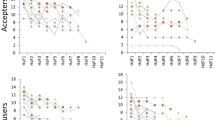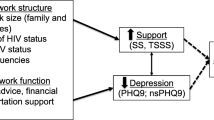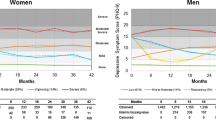Abstract
This research tested if a 12-session coping improvement group intervention (n = 104) reduced depressive symptoms in HIV-infected older adults compared to an interpersonal support group intervention (n = 105) and an individual therapy upon request (ITUR) control condition (n = 86). Participants were 295 HIV-infected men and women 50-plus years of age living in New York City, Cincinnati, OH, and Columbus, OH. Using A-CASI assessment methodology, participants provided data on their depressive symptoms using the Geriatric Depression Screening Scale (GDS) at pre-intervention, post-intervention, and 4- and 8-month follow-up. Whether conducted with all participants (N = 295) or only a subset of participants diagnosed with mild, moderate, or severe depressive symptoms (N = 171), mixed models analyses of repeated measures found that both coping improvement and interpersonal support group intervention participants reported fewer depressive symptoms than ITUR controls at post-intervention, 4-month follow-up, and 8-month follow-up. The effect sizes of the differences between the two active interventions and the control group were greater when outcome analyses were limited to those participants with mild, moderate, or severe depressive symptoms. At no assessment period did coping improvement and interpersonal support group intervention participants differ in depressive symptoms.

Similar content being viewed by others

References
Beck, A. T., Steer, R. A., & Brown, G. K. (1996). Manual for the beck depression inventory-II. San Antonio, TX: The Psychological Corporation.
Centers for Disease Control and Prevention. (2006). HIV/AIDS surveillance report, 2005 (17th ed.). Atlanta: US Department of Health and Human Services.
Centers for Disease Control and Prevention. HIV/AIDS Surveillance Report (2007). Vol. 19. Atlanta: U.S. Department of Health and Human Services, Centers for Disease Control and Prevention; 2009: [page 15]. http://www.cdc.gov/hiv/topics/surveillance/resources/reports/.
Chesney, M. A., Chambers, D. B., Taylor, J. M., Johnson, L. M., & Folkman, S. (2003). Coping effectiveness training for men living with HIV: Results from a randomized clinical trial testing a group-based intervention. Psychosomatic Medicine, 65, 1038–1046.
Emlet, C. A. (2007). Experiences of stigma in older adults living with HIV/AIDS: A mixed-methods analysis. AIDS Patient Care and STDS, 21, 740–752.
Folkman, S., Chesney, M., McKusick, L. et al. (1991). Translating coping theory into intervention. In Eckenrode (Ed.), The social context of coping. New York: Plenum, pp. 239–259.
Folstein, M. F., Folstein, S. E., McHugh, P. R. (1975). Mini-mental state. A practical method for grading the cognitive state of patients for the clinician. Journal of Psychiatric Research, 12, 189–198.
Frank, J. D. (1971). Therapeutic factors in psychotherapy. American Journal of Psychotherapy, 25, 350–361.
Goulet, J. L., Fultz, S. L., Rimland, D., Butt, A., Gilbert, C., Rodriguez-Barradas, M., et al. (2007). Aging and infectious diseases: Do patterns of comorbidity vary by HIV status, age, and HIV severity? Clinical Infectious Diseases, 45, 1593–1601.
Heckman, T. G., Barcikowski, R., Ogles, B., Suhr, J., Carlson, B., Holroyd, K., et al. (2006). A telephone-delivered coping improvement group intervention for middle-aged and older adults living with HIV/AIDS. Annals of Behavioral Medicine, 32, 27–38.
Heckman, T. G., Heckman, B. D., Kochman, A., Sikkema, K. J., Suhr, J., & Goodkin, K. (2002). Psychological symptoms among persons 50 years of age and older living with HIV disease. Aging and Mental Health, 6, 121–128.
Hedge, B., & Glover, L. F. (1990). Group intervention with HIV seropositive patient and their partners. AIDS Care, 2, 147–154.
Justice, A. C., & Weissman, S. (1998). The survival experience of older and younger with AIDS. Research on Aging, 20, 665–685.
Kalichman, S. C., Heckman, T. G., Kochman, A. R., Sikkema, K. J., & Bergholte, J. (2000). Suicidal ideation among midlife and older adults living with HIV/AIDS. Psychiatric Services, 51, 903–907.
Kalichman, S. C., Ramachandran, B., & Ostrow, D. (1999). Protease inhibitors and the new AIDS combination therapies: Implications for psychological services. Professional Psychology: Research and Practice, 29, 349–356.
Kelly, J. A., Murphy, D. A., Bahr, G. R., Kalichman, S. C., Morgan, M. G., Stevenson, L. Y., et al. (1993). Outcome of cognitive-behavioral and support group brief therapies for depressed persons diagnosed with HIV infection. American Journal of Psychiatry, 150, 1679–1680.
Leserman, J. (2008). Role of depression, stress, and trauma in HIV disease. Psychosomatic Medicine, 70, 539–545.
Levy, J. A., Ory, M. G., & Crystal, S. (2003). HIV/AIDS interventions for midlife and older adults: Current status and challenges. Journal of Acquired Immune Deficiency Syndromes, 33(2), S59–S67.
Meadows, J., le Marechal, K., & Catalan, J. (1998). Mental health problems in older adults with HIV referred to a psychological medicine unit. AIDS Care, 10(Supp. 2), S105–S112.
Oursler, K. K., Goulet, J. L., Leaf, D. A., Akingicil, A., Katzel, L. I., Justice, A., et al. (2006). Association of comorbidity with physical disability in older HIV-infected adults. AIDS Patient Care and STDs, 20, 782–791.
Paul, S. M., Martin, R. M., Lu, S., & Lin, Y. (2007). Changing trends in human immunodeficiency virus and acquired immunodeficiency syndrome in the population aged 50 and older. Journal of the American Geriatric Society, 55, 1393–1397.
Raudenbush, S. W., & Bryk, A. S. (2002). Hierarchical linear models: Applications and data analysis methods. California: Sage Publications.
Ravitz, P., Maunder, R., & McBride, C. (2008). Attachment, contemporary interpersonal theory and IPT: An integration of theoretical, clinical, and empirical perspectives. Journal of Contemporary Psychotherapy, 38, 11–21.
Ruskin, P. E., Silver-Aylaian, M., Kling, M. A., et al. (2004). Treatment outcomes in depression: Comparison of remote treatment through telepsychiatry to in-person treatment. American Journal of Psychiatry, 161, 1471–1476.
SAS Institute Inc. (c) (2002–2003). Cary, NC, USA.
Schroder, K. E. E., Care y, M. P., & Vanable, M. P. (2003). Methodological challenges in research on sexual risk behavior: II. Accuracy of self-reports. Annals of Behavioral Medicine, 26, 104–123.
Sikkema, K. J., Hansen, N. B., Ghebrmichael, M., Kochman, A., Tarakeshwaqr, N., Meade, C. S., et al. (2006). A randomized controlled trial of a coping group intervention for adults with HIV who are bereaved: Longitudinal effects on grief. Health Psychology, 25, 563–570.
Sikkema, K. J., Hansen, N. B., Kochman, A., Tarakeshwar, N., Neufeld, S., Meade, C. S., et al. (2007). Outcomes from a group intervention for coping with HIV/AIDS and childhood sexual abuse: Reductions in traumatic stress. AIDS and Behavior, 11, 49–60.
Sikkema, K. J., Wilson, P. A., Hansen, N. B., Kochman, A., Neufeld, S., Ghebremichael, M. S., et al. (2008). Effects of a coping intervention on transmission risk behavior among people living with HIV/AIDS and a history of childhood sexual abuse. Journal of Acquired Immune Deficiency Syndromes, 47, 506–513.
Stangier, U., Consbruch, K., Schramm, E., & Heidenreich, T. (2009). Commons factors of cognitive therapy and interpersonal psychotherapy in the treatment of social phobia. Anxiety, Stress, and Coping, 6, 1–13.
Teng, E. L., & Chui, H. C. (1987). The Modified Mini-Mental Status (3MS) examination. Journal of Clinical Psychiatry, 48, 314–318.
Web MD. HIV/AIDS cases growing in U.S. adults over 50. Article retrieved December 19, 2007 from http://www.webmd.com/hiv-aids/news/20050513/hivaids-cases-growing-in-us-adults-over-50.
Yesavage, J., Brink, T., Rose, T. et al. (1982–1983). Development and validation of the geriatric depression screening scale: A preliminary report. Journal of Psychiatric Research, 17, 37–49.
Acknowledgments
The AIDS and Aging Research Group is comprised of the following individuals: Ohio site; Travis Lovejoy, M.A., Rewadee Watakakosol, M.A, David Cosio, M.A., Monica Silverthorn, M.S.W, and Robert Barcikowski, Ph.D..; New York site; Allyson Delorenzo, James Masten and Patrick Wilson. This research was funded by Grants R01-MH067568 (National Institute of Mental Health, National Institute of Nursing Research, National Institute on Aging) and R01MH078749 (National Institute of Mental Health and National Institute of Nursing Research). No author is reporting a conflict of interest, financial or otherwise. We extend our appreciation to the many AIDS service organizations that collaborated on this study and to all study participants. We also thank John Markowitz, M.D. and Joseph Bianco, Ph.D. for reading an initial version of this manuscript.
Author information
Authors and Affiliations
Consortia
Corresponding author
Additional information
Clinical Trials Identifier: NCT00365690: “Effectiveness of a Telephone-Delivered Behavioral Treatment to Improve the Quality of Life of Older Adults With HIV”.
Rights and permissions
About this article
Cite this article
Heckman, T.G., Sikkema, K.J., Hansen, N. et al. A randomized clinical trial of a coping improvement group intervention for HIV-infected older adults. J Behav Med 34, 102–111 (2011). https://doi.org/10.1007/s10865-010-9292-6
Received:
Accepted:
Published:
Issue Date:
DOI: https://doi.org/10.1007/s10865-010-9292-6



